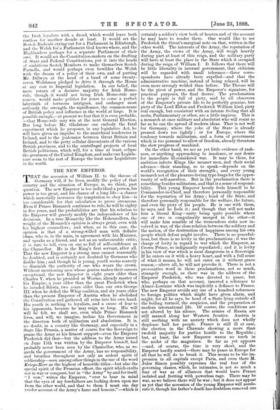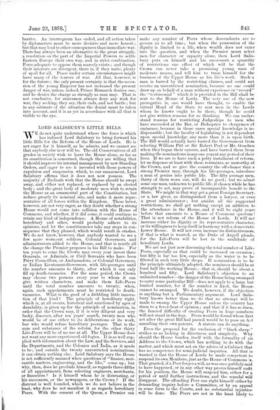THE NEW EMPEROR. T HAT the accession of William IL to
the throne of Germany will, if he lives, modify the policy of that country and the situation of Europe, is, we think, past question. The new Emperor is too individual a person, his power is too great, and his chance of a long life—a chance which materially increases the temptation to obey him—is too considerable for that calculation to prove erroneous. Even if Prince Bismarck continues to rule, he will be eighty in five years, and the probabilities are that his relation to the Emperor will gravely modify the independence of his decisions. In a true Monarchy like the Hohenzollern, the weight of the Monarch's opinion is always great, even with his highest counsellors ; and when, as in this case, the opinion is that of a strong-willed man with definite ideas, who is, in the main, in agreement with his Minister, and speaks as a friend, and not as an unfavourable critic, it is sure to tell, even on one so full of self-confidence as the Chancellor. He is the King's first servant, after all. That the new Emperor is a strong man cannot reasonably be doubted, and is certainly not doubted by Germans who dislike him ; and though he is young, youth seems scarcely to diminish the authority of one who wears the crown. Without mentioning men whose genius makes their careers exceptional, the new Emperor is eight years older than Charles V. when he presided at Worms, already master of his Empire, a year older than the great Frederick when he invaded Silesia, two years older than our own George III. when he defied the Whig coalition, and six years older than the present Emperor of Austria when he abolished the Constitution and gathered all reins into his own hand. His youth is nothing to loyalists, and a cause of fear to his opponents, because he may reign so long. His will will be felt, we shall see, even while Prince Bismarck lives, and will, we imagine, incline his Government in the direction both of militarism and absolutism. It is, no doubt, in a country like Germany, and especially in a State like Prussia, a matter of course for the Sovereign to praise the Army as his firmest support—even the Emperor Frederick did that—but the address to the Army issued on June 15th was written by the Emperor himself, had probably never been seen by the Chancellor, who, as re- gards the government of the Army, has no responsibility, and breathes throughout not only an ardent spirit of soldiership—seen among other things in the use of the word Irriega-Herr as the highest of honorific titles—but also the special spirit of the Prussian officer, the spirit which exults not in war or conquest, but in "the Army" by and for itself. " I vow," writes the Emperor, "ever to bear in mind that the eyes of my forefathers are looking down upon me from the other world, and that to them I must one day render account of the Army's fame and honour,"—which is certainly a soldier's view both of heaven and of the account he may have to render there. One would like to see Frederick the Great's marginal note on that, written in the other world. The interests of the Army, the reputation of the Army, the views of the Army, will weigh heavily during part at least of this reign, and the military party will have at least the place in the State which it occupied during the reign of William I. It follows that there will be little liberality in internal government, that criticism will be regarded with small tolerance—three corre- spondents have already been expelled—and that the administrative machine, instead of being relaxed, will be even more strongly welded than before. The Throne will be the pivot of power, and the Emperor's signature, for practical purposes, the final decree. The proclamation to the people is full of piety, said by all observers of the Emperor's private life to be perfectly genuine, but piety of the Lord Eldon and Frederick William kind, piety real enough, but consistent with an intense feeling that all mobs, Parliamentary or other, are a little impious. This is a monarch at once military and absolutist who will resist so far as he can the spread of modern ideas. That is not well for Germany, where the yoke of the State is already pressed down too tightly ; or for Europe, where the tendency towards militarism, and a form of government which is too personal to allow of freedom, already threatens the slow progress of mankind.
On the other hand, we see as yet little evidence of rash- ness, or anything approaching to insolence, or any desire for immediate ill-considered war. It may be there, for ambition infects Kings like meaner men, and their social advance—their standing, so to speak—depends on the world's recognition of their strength ; and every young monarch not of the pleasure-loving type longs for the oppor- tunity of self-assertion. But in the proclamation there is something besides militarism, and that is a sense of responsi- bility. This young Emperor keenly feels himself to be Commander-in-Chief, and therefore personally responsible for the reputation of his Army ; head, of the State, and therefore personally responsible for the welfare, the future, and even the piety of his people. He is one with them, he says, and he feels it ; and though that will not make him a liberal King—unity being quite possible where one of two is compulsorily merged in the other—it will make him sensible of the tremendous risks now in- volved in war, of the close relation between the soldiery and the nation, of the destruction of happiness among his own people which defeat might involve. There is no peaceful- ness, but there is no levity in the proclamations ; it was the charge of levity in regard to war which the Emperor, as Crown Prince, so indignantly repudiated ; and it is levity in his view of war which is most dangerous in a Sovereign. If he enters on it with a heavy heart, and with a full sense of what it means, he will not enter on it without grave reason,—above all, he will not provoke it. There is not a provocative word in these proclamations, not so much, strangely enough, as there was in the address of the Emperor Frederick, who was devoted to peace, but who, perhaps on that account, inserted a reference to Alsace-Lorraine which was implicitly a defiance to France. The new Emperor avoids any one of a hundred references to foreign politics which might have given alarm, and might, for all he says, be head of a State lying outside all the boiling turmoil, the suspicion, and the preparation of modern international life. Of course, the conditions are not altered by his silence. The armies of Russia are still massed along her Western frontier. Austria is still seething with an anxiety which does not wholly displease half her people. France is still ill at ease, the election in the Charente showing a more than twofold majority for parties hostile to the Republic ; but, at least, the new Emperor waves no torch in the midst of the magazines. So far as yet appears —and, of course, the time is very short, and the Emperor hardly seated—there may be peace in Europe for all that he will do to break it. This seems to be the im- pression in all capitals except Paris, and even there M. Jules Simon possibly expresses the real fear of the governing classes, which, he intimates, is not so much a fear of wax as of alliances that would leave France isolated and fretting with powerless rage. There may be war, as we believe there will be war ; but it does not appear as yet that the accession of the young Emperor will accele- rate it, though his father's death has doubtless removed one barrier. An interregnum has ended, and all action taken by diplomatists must be more decisive and more honest ; but that may lead to other consequences than immediate war. There has always been an alternative to the great struggle, a resolution on the part of the Imperial Powers to settle Eastern Europe their own way, and in strict combination. Force adequate to oppose them scarcely exists ; and though their interests are divergent, there is, if they unite, plenty of spoil for all. Peace under certain circumstances might have many of the terrors of war. All that, however, is for the future ; the only present certainty is that the acces- sion of the young Emperor has not increased the present danger of war, unless, indeed, Prince Bismarck desires one, and he denies the charge as strongly as man may. That is not conclusive, for statesmen always deny any wish for war, they seeking, they say, their ends, and not battle ; but in any estimate of the situation the denial must be taken into account, and it is as yet in accordance with all that is visible to the eye.







































 Previous page
Previous page